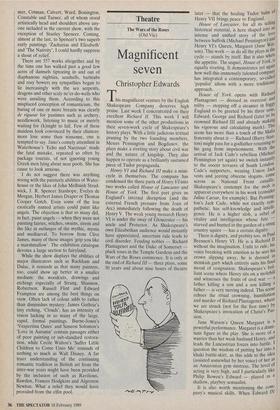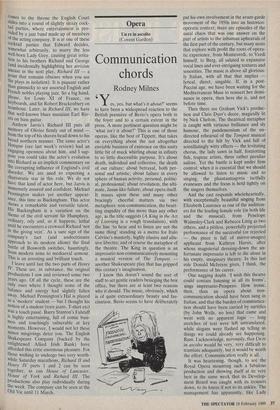Theatre
The Wars of the Roses (Old Vic)
Magnificent seven
Christopher Edwards
This magnificent venture by the English Shakespeare Company deserves high praise. Last week I concentrated on their excellent Richard II. This week I will mention some of the other productions in their seven-work cycle of Shakespeare's history plays. With little judicious textual pruning by the two founding members, Messrs Pennington and Bogdanov, the plays make a riveting story about civil war and the nature of kingship. They also happen to operate as a brilliantly sustained piece of Tudor propaganda.
Henry VI and Richard III make a mini- cycle in themselves. The company has condensed the three parts of Henry VI into two works called House of Lancaster and House of York. The first part gives us England's internal disruption (and the external French pressure from Joan of Arc) immediately following the death of Henry V. The weak young monarch Henry VI is under the sway of Gloucester — his uncle and Protector. As Shakespeare's own Elizabethan audience would instantly have appreciated, uncertain rule leads to civil disorder. Feuding nobles — Richard Plantagenet and the Duke of Somerset pluck roses in the Temple Gardens and the Wars of the Roses commence. It is only at the end of Richard III — three plays, some 50 years and about nine hours of theatre
later — that the healing Tudor balm of Henry VII brings peace to England.
House of Lancaster, for all its telling historical material, is here shaped into an intense and unified story of the love between Suffolk (Michael Pennington) and Henry VI's Queen, Margaret (June Wat- son). This work — as do all the plays in the cycle — stands by itself. But it also whets the appetite. The sequel, House of York, is equally riveting. It demonstrates yet again how well this immensely talented companY, has integrated a contemporary, so-called `populist' idiom with a more traditional approach. House of York opens with Richard Plantagenet — dressed in overcoat and trilby — stepping off a steamer in foggY England to be greeted by his three sons, Edward, George and Richard (later to be crowned Richard III and already making his vigorous and calculating mark). This scene has more than a touch of the Mafia fraternity about it — Richard (Barry Stan- ton) might pass for a godfather returning to his gang from imprisonment. With the arrival of Jack Cade's rebellion (Michael Pennington yet again) we switch instantly to the soccer terraces of South London. Cade's supporters, wearing Union Jack vests and jeering obscene slogans, come across as National Front canaille. Shakespeare's contempt for the mob is apparent everywhere in his work (consider Julius Caesar, for example). But Penning- ton's Jack Cade, while not exactly sym- pathetic, has self-knowledge and intelli- gence. He is a higher slob, a rebel of vitality and intelligence whose fate -- starved and hunted in the garden of a smug country squire — has a certain dignity. There is dignity, and probity too, in Paul Brennen's Henry VI. He is a Richard II without the imagination. Unfit to rule, his voice breaking with emotion as he sees his crown slipping away, he is dressed in monkish garb which entirely suits his final mood of resignation. Shakespeare's bril- liant scene where Henry sits on a molehill and witnesses the fruits of civil war — father killing a son and a son killing a father — is very moving indeed. This scene echoes the ritual crowning, humiliation and murder of Richard Plantagenet, where we are struck (not for the first time) by Shakespeare's invocation of Christ's Pas- sion.
June Watson's Queen Margaret is a powerful performance. Margaret is a domi- nant figure in the play. She is more of a warrior than her weak husband Henry, and leads the Lancastrian forces into battle. I question the wisdom of putting her into a khaki battle-skirt, as this adds to the idea (assisted somewhat by her voice) of her as an Amazonian gym mistress. The level of acting is very high, and I particularly like Philip Bowen's Edward — played as a shallow, playboy sensualist.
It is also worth mentioning the com- pany's musical skills. When Edward IV
conies to the throne the English Court slides into a round of slightly sleazy cock- tail parties, where entertainment is pro- vided by a jazz band made up of members of the acting company. It is at one of these cocktail parties that Edward decides, somewhat arbitrarily, to marry the less Well-born Lady Grey, causing great irrita- tion to his brothers Richard and George (and incidentally highlighting her arriviste unease in the next play, Richard III — a Point that remains obscure when you see the Plays in isolation). It is piquant rather than gimmicky to see assorted English and French nobles playing jazz. So a big hand, Please, for Louis XI of France, on keyboards, and Sir Robert Brackenbury on trombone. Later, in Richard III, we have that well-known blues musician Earl Riv- ers on bass guitar. Andrew Jarvis's Richard III puts all memory of Olivier firmly out of mind from the top of his shaven head down to his broad northern manner. The same actor's Hotspur (see last week's review) had an engaging openness about him, and I sup- pose you could take the actor's evolution into Richard as an implicit commentary on the corrupting influence of England's civil disorder. We are used to expecting a charismatic star in this role. We do not have that kind of actor here, but Jarvis is immensely assured and confident. Michael Pennington makes yet another appear- ance, this time as Buckingham. This actor shows a remarkable and versatile talent. His Buckingham is a variation on the theme of the civil servant Sir Humphrey, ordinary, oily and, as it happens, lethal until he encounters a crowned Richard `not in the giving vein'. As a sure sign of the company's tact (and undoctrinaire approach to its modern idiom) the final battle of Bosworth switches, hauntingly, trom modern arms to mediaeval armour. This is an arresting and brilliant touch. I leave until last the two parts of Henry These are, in substance, the original productions I saw and reviewed some two Years ago. Of all the cycle, these are the only ones where I thought some of the balance and energy had slightly fallen away. Michael Pennington's Hal is played as a 'modern' student — but I thought his notion of a student (torn jeans, T-shirt etc) Was a touch passé. Barry Stanton's Falstaff is highly entertaining, full of comic busi- ness and touchingly vulnerable at key moments. However, I would not let these minor misgivings deter you. The English Shakespeare Company (backed by the enlightened Allied Irish Bank) have afforded this critic enormous pleasure. For those wishing to undergo two very worth- while Saturday marathons, Richard II and Henry IV parts 1 and 2 can be seen together, as can House of Lancaster, House of York and Richard III. The productions also play individually during the week. The company can be seen at the Old Vic until 11 March.



















































 Previous page
Previous page